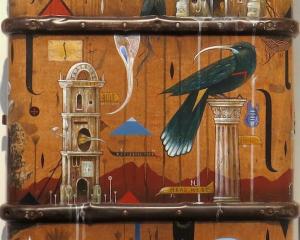A year as Burns Fellow is such a gift, Emma Neale says. It allowed her to work on her own writing without having to undertake freelance editing work or teaching to pay the bills.
It is a tenuous existence being a novelist, poet, writer and editor, and with the industry changing so much these days, there is even less certainty than there used to be. Sometimes, Neale says with a laugh, she wishes she had not listened to her father, who told her not to train as a doctor.
However, the way she sees the world now and the way she translates experience, processes, relationships, people and new concepts is so bound up with being a writer that it would be impossible for her not to write. Literature, whether for the reader or writer, is so enriching and mind-broadening, she says.
''I don't think there is any better way of teaching us what it's like to be under someone else's skin. Even other art forms like film don't actually give the same intellectual independence that reading does and they don't take us as intimately into the thought processes of other people and other characters.''
Neale has published five novels, four collections of poems, and edited two anthologies of writing, among other things, and has another novel and more poems under way from last year's work. The Truth Garden (Otago University Press), her latest book of poems, was published last year, part of the prize for the Kathleen Grattan Award for poetry she won the previous year.
For it she selected poems written over the past few years that deal with some of the themes cropping up regularly in her work - relationships, parenting, home and garden.
Her writing often seems to pivot on concerns such as the way family and context help shape identity, she says.
The novel she was working on last year also shares with her previous one, Fosterling (2011), a notion of social exile, she says.
''That tension between how you create a stable and healthy identity versus social pressures to conform and behave in a certain way - and you are actually pushed up against that as a parent too, in terms of what you allow your children to do, and what their own innate drives are.''
At the beginning of her fellowship year she planned to work on a novel and a suite of interrelated poems, but both projects bucked away from her and turned into something else. The novel went on the back burner because she felt the emotional territory was too dark to tackle at that time, while the suite of poems turned into a novel and some unexpected poems emerged in their place, Neale says.
''I think actually the idea that I had probably all along was going to be better in prose. I guess I was trying to give myself a new challenge saying it would be a sequence of poems.''
The novel is about a little boy who has been through severe trauma and bereavement and is living an intense imaginative life as a way of coping, but it becomes a problem for his family and his school. Although Neale had originally approached it as pure comedy, once she realised what kind of family situation and background a child living like that would have to have, she knew it would have to be more complex, she said.
''Because one of the main actors is a child, it has quite a lot of levity and humour, so it actually still does have, I guess, a more redemptive quality than the other dark one I abandoned.''
Whereas her fiction tends to explore the question ''what if?'' more overtly and inhabit a more obviously fictional scenario, as well as looking at the psychology of characters, her poems tend to seize on an overheard phrase or capture an image, Neale says.
''I use that as the seed to grow into something I hope is musical but also sometimes tells a brief snippet of story. I suppose some of the poems are more like photographs in words - they don't all have narratives. They may be moments of apprehension and vision.''
Although her poems follow life more than fiction, even if they do spring from something personal, Neale tries to find something archetypal or mythic that they might feed into, she says.
''I was asked recently whether it was difficult to be so exposing in my work, and it reminded me of something Fleur Adcock said to me once in an interview, and that was people don't realise how much you censor and discard and frame. You are only ever making public things that have been very shaped and crafted and also you select very carefully which things you are willing to air.''
It is something many people who write poems do not realise, she says.
As the editor of the Otago Daily Times Monday poetry column, she says a lot of people still think poetry is an outpouring of emotion that has not been crafted and shaped. Poems submitted for publication are often deeply personal and clearly needed to be written as therapy for the writer, but the writer has not thought about the audience, she says.
''I'm always trying to be as democratic as possible in the sense of getting new writers and previously published writers, but my main criteria is I want it to be as good as possible.''
When she was a student, Dr Neale vacillated between thinking she wanted an academic career and wanting to work in publishing. While she was completing her PhD in London, her mother and stepfather, Barbara and Chris Else, who run a literary agency in New Zealand, asked her to do some work for them meeting agents and publishers to see if she could get New Zealand fiction accepted by UK publishing houses.
''I felt fraudulent because here I was studying literature and trying to be a marketing person, but I'd never really experienced what it was like to write a novel from the inside. I felt no matter how much academic study I've done, I can't really know what it's like until I've tried it myself, so I started writing a novel as a way of being more articulate about the process, thinking I'd be a representative of other writers rather than expecting my own work to have any success.''
She had already been publishing poetry, and sent her first fiction manuscript, Night Swimming, to the Elses as part of the apprenticeship. They said they would like to be her agents, which she found encouraging but daunting as she had to rewrite the novel several times.
''Each time I remember thinking `this is just too hard. I'm going to stop' because I hadn't realised how intense it would all be. You'd feel so depleted at the end of each draft; you'd feel this has to be it, there's nothing else to call up, there's no energy left. But then eventually it would trickle back and I'd have another go.''
Night Swimming was published in 1998.
Her novels take four or five years to complete because she usually has to fit them around family life - she and her partner have two sons, Abe (10) and Zac (nearly 3). Although she did not have to divide her time doing editing work as well last year, there was a temptation to try to fit an entire writing career into the fellowship year, she says with a laugh.
The new year will see Neale back at the University of Otago from mid year, teaching on the creative writing course. Before then, it's freelancing again, meeting the deadlines so she can get back to the novel.
Read it
The Truth Garden, by Emma Neale, winner of the Kathleen Grattan Award for Poetry 2011, is published by Otago University Press.













